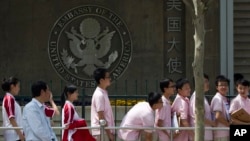Student Union
Foreign Students Caught Between COVID-19 and ICE
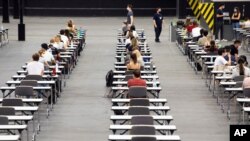
Pat Janyamethakul, a Thai student at Virginia Tech, wanted to attend college in the U.S. because of “the country’s reputation in higher education.” The senior says that earning a degree here would “set her apart” from her peers back in Thailand.
Rafael Lima, a Brazilian student, has one more year to go at Wake Forest University in North Carolina. The communications major is on a four-year, full-ride scholarship, one of only four awarded to a scholar in his country by a private donor from Brazil.
Alejandra G'valen is from Mexico. She’s been in the U.S. for six years, earned her undergraduate degree and is finishing a master's degree in theological ethics at Lee University in Tennessee. G'valen says, “The experience we lived ... when the cartels terrorized our city, [was] extremely traumatizing.”
Janyamethakul, Lima and G'valen are among 1 million international students in the United States. This week, U.S. Immigration and Customs Enforcement (ICE) announced that F-1 visa holders will have to leave the country or risk deportation unless they take fall classes in person and not online only.
While 60% of colleges and universities say they will have most classes on campus in person, all schools are grappling with how to teach, while keeping their students and staff healthy and safe during the coronavirus pandemic.
Students say they are caught between being exposed to the coronavirus in the U.S., where cases are increasing, and the risk of losing their immigration status.
“If I cannot return to the United States due to the travel restrictions, the new ICE regulations suggest that my visa status will be terminated,” Brazilian Dan Setton, a rising junior at the University of Evansville in Indiana, said.
“This is completely unconscionable and arbitrary as I haven't done anything wrong. I know a lot of students in my situation and some that will now have to leave the U.S. -- in the middle of a pandemic -- because their schools are going fully online,” Setton said.
Lima says he worries about many things, his scholarship near the top of the list.
“I don't know how that will affect my scholarship,” he says. “One of the requirements of my scholarship is maintaining full regular standing [over] eight semesters … attending classes in person and keeping your visa active. … I don't even know, for example, if I take online classes in Brazil, I will receive a part of my scholarship or none of my scholarship money at all. So there's, there's still that that I have to figure out.”
Nine percent of 1,090 U.S. universities -- or 98 institutions -- are planning for a fall semester exclusively online, according to the Chronicle for Higher Education, which since March has been tracking which colleges and universities will teach online, in person or a hybrid of both.
An additional 24% say they are planning a hybrid model (part in class, part online), and 7.2% undecided or undeclared. Sixty percent say they are planning for an in-person semester.
Virginia Tech is planning a hybrid model this fall. Janyamethakul says she fears being infected by the coronavirus if she returns to Virginia Tech because “no one is willing to heal you, and not to mention the lack of PPE and health care facilities in the United States.”
ICE’s new regulation conflicts with colleges’ and universities’ teaching plans for the fall semester, as well as international students and their immigration status.
Various school and work visas seem to be increasingly difficult to obtain, she says, and “worst of all, I have to risk my life by traveling, risking contracting COVID-19.”
“The rules keep changing and the university keeps postponing regulations in regards to international students because they are waiting for DHS to publish a Temporary Final Rule in the Federal Register,” Janyamethakul said. “The current regulations are pretty much for citizens and all the options given to us are pretty much all disadvantageous.”
Lee University, G'valen’s college, is one of 60% of U.S. universities planning to resume in-person classes and activities this fall, according to the university’s website.
“If the plans don't come through, and let's say they don’t make a final decision by August, I have nowhere to go. I am in limbo, together with many other students,” G'valen said.
If she is unable to return to campus, G'valen “would have to move further to the center of Mexico with some distant cousins” until the pandemic is over.
Some universities are making accommodations.
Columbia University in New York says it will offer one-credit classes in person to international students so they meet ICE’s requirements and can come back or stay in the U.S. “We want our international students to be able to complete their studies here if possible,” officials said in an email to the university community.
and dis pic.twitter.com/rIVuiso7MC
— myesha thee stallion (@myeshachou) July 8, 2020
“For the large community of international students who cannot come to Columbia because of the pandemic, we will be adapting our network of Columbia Global centers in new locations to provide in-person academic and peer engagement.”
and dis pic.twitter.com/rIVuiso7MC
— myesha thee stallion (@myeshachou) July 8, 2020
Freshmen and sophomores will be on campus in the fall, juniors and seniors in the spring. International students will be welcome on the New York City campus year-round.
Harvard University and Massachusetts Institute of Technology filed suit Wednesday against the Department of Homeland Security -- ICE’s federal parent agency -- to stave off the action.
And students have launched online petitions, including one on the White House website, a site created in 2001 by the Obama administration.
A petition with more than 308,000 signatures Wednesday afternoon on Change.org requests that F-1 and M-1 students be able to remain in the U.S. with online-only classes.
“I just want to try to get back to my normal life,” Lima laments, calling the year so far “really chaotic.” He was studying abroad in Belgium this winter when the coronavirus pandemic erupted. After 27 hours of travel that wove north and south before landing in South America, the Brazilian tested positive for COVID-19.
“Just the feeling of me being back in, like, a college dorm where I have, like, all my stuff sorted out,” he said in a Skype interview with VOA. “When I only have to worry about studying, instead of worrying about my visa, worrying about my health, worrying about not affecting my family, worrying about, like, a myriad of stuff.”
“I was really looking forward to that,” says Lima, who has just his senior year to finish.
“I really don't know how, how am I going to be able to do that this semester with all the restrictions that I have to face right now,” he asked.
Ruby Rosenthal and Aline Barros contribued to this report.
See all News Updates of the Day
- By VOA News
International students discuss US campus culture shock

International students at De Anza College in Cupertino, California, talked about culture shock in an article in La Voz News, the student newspaper.
"It felt like a major culture shock. Everything was so different, from academics to mannerism," said a student from Mexico.
Read the full story here.
These are the most expensive schools in the US
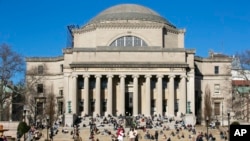
High tuition costs along with housing and food expenses can add up for students at U.S. colleges and universities.
MSNBC looked at the most expensive schools in the country, with one costing more than $500,000 for a bachelor’s degree. (June 2024)
Uzbekistan students admitted into top US universities
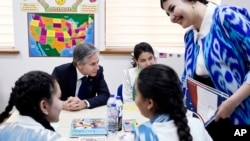
Students from Uzbekistan are among the international students admitted to top colleges and universities in recent years.
Gazata.uz profiled some of the Uzbekistan students attending Harvard, Brown, Princeton and other U.S. universities. (June 2024)
- By Stella Hsu
Reports of visa checks, deportations worry Chinese STEM students in US
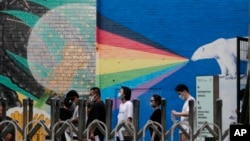
Geopolitical tensions and growing competition in tech between the United States and China appear to be spilling over into academia despite commitments from the world’s two biggest economies to boost people-to-people exchanges.
The United States remains the top choice for Chinese students seeking to study abroad with nearly 300,000 studying in American colleges and universities during the 2022-2023 school year. But reports of some cases that students and professors are facing extra scrutiny while passing through immigration and the deportation of others are raising concerns.
For Chen Xiaojin, a doctoral student studying semiconductor materials at a university in the Washington, D.C., metropolitan area, it has been six years since she returned to her hometown of Beijing.
At first, it was the COVID-19 pandemic that kept her from going home. But over the past two years, she has been deterred by accounts of Chinese students majoring in science and engineering being required to reapply for their visas upon returning to China.
She also says she is worried by reports over the past six months of Chinese students being deported, even at nearby Dulles Airport.
"My current research is relatively sensitive, and my boss [adviser] is getting funds from the U.S. Department of Defense, making it even more sensitive,” she told VOA. "I am afraid that I won't be able to return after I go back [to China]."
Chen says that if she did return to China, she would have to apply for a new visa.
In a report late last month, Bloomberg said it had found at least 20 Chinese students and scholars with valid visas who were deported at U.S. Customs since November and barred from reentry. The U.S. Customs and Border Protection Agency does not release relevant data.
Immigration attorney Dan Berger represented one Chinese student who was deported late last year. He tells VOA Mandarin that the student studied biological sciences at Yale University and was about to complete her doctorate.
She visited her family in China and got a new visa but was deported by customs at Dulles Airport and barred from reentering the country for five years. Berger said he did not see anything suspicious in the transcript of the conversation between the student and the customs officer.
"We have seen what seems like a pattern over the last six months of Chinese PhD students being turned around…. more than I've seen in quite a while," he said.
Matthew Brazil, a fellow at the Jamestown Foundation, said neither country seems willing to explain the situation. However, he believes that in most cases, the United States must have valid reasons for blocking visa holders from entering the country.
In some cases, the student’s background may not match what is written on the visa application. In other cases, customs agents may also find something that the State Department missed, and once they see it, they are responsible for taking action.
"I wish the Chinese side would be specific about their students who were refused entry,” he said. “The fact that both sides are mum on details and that the Chinese side is engaged with the usual angry rhetoric means that each has security concerns. And that says to me that there was good reason for the U.S. to stop these particular applicants."
Brazil also sees a connection between the entry denials and export control regulations issued by the United States in October 2022 that restrict China's ability to obtain advanced computing chips, develop and maintain supercomputers, and manufacture advanced semiconductors.
U.S. Customs and Border Protection is one of the law enforcement agencies authorized to investigate violations of export control regulations, he said.
"Beijing's intelligence agencies are known to focus attention on PRC [People's Republic of China] students and scientists headed abroad who study or work on dual-use technologies controlled under the Export Administration Act — compelling Chinese students and scientists to report on what they've learned when they return to China on holiday,” he said. “This has been true for decades."
Bill Drexel, a fellow for the Technology and National Security Program at the Center for a New American Security, said the U.S. government did find some cases where students tried to steal strategic technology for China.
"I think it would both not be surprising that they found some really questionable or incriminating evidence for some students,” he said. “It would also not be surprising if, in their hunt for really solid evidence, they also may have made some mistakes on other students.”
Drexel adds that “it’s just kind of an unfortunate fact of the time that we live in and the tactics that the CCP uses when it comes to these measures."
In a post on X in early May, U.S. ambassador to China Nicholas Burns tried to dispel concerns about visas and entry to the United States for students and scholars. In the post, he said "99.9% of Chinese students holding visas encounter no issues upon entering the United States.”
In an interview with The Wall Street Journal Monday, Burns said it is China that is making it impossible to promote people-to-people ties. Burns told the Journal that students attending events sponsored by the United States in China have been interrogated and intimidated.
He also said that since U.S. President Joe Biden and China’s leader Xi Jinping held their summit in San Francisco last year, China’s Ministry of State Security and other agencies had interfered with Chinese citizens’ participation at some 61 events.
At a regular briefing on Wednesday, Chinese Foreign Ministry spokesperson Mao Ning dismissed those accusations, saying that they did not “reflect reality" and that went against key understandings reached by both countries’ presidents in San Francisco.
“The United States, under the pretext of 'national security,' unjustifiably harasses, interrogates, and deports Chinese students in the U.S., causing them significant harm and creating a severe chilling effect,” Mao said. “The image of the United States in the minds of the Chinese people fundamentally depends on the actions of the United States itself.”
Drexel said he believes Burns’ comments about visas and students' willingness to study in the U.S. still ring true.
“On balance, it's still the case that American universities are overwhelmingly warm towards Chinese students and want them in large numbers," he said.
However, Berger, the immigration lawyer, is concerned about the chilling effect recent cases involving Chinese students could have.
"In general, we are being more careful about advising Chinese graduate students in STEM fields about traveling and letting them know that there is some small risk,” he said.
Even though the risk is small, it does seem to be real at the moment, he said.
Adrianna Zhang contributed to this report.
US federal judge blocks new regulation targeting for-profit colleges
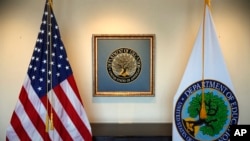
A federal judge in Texas has blocked a regulatory provision targeting for-profit colleges that was scheduled to take effect in July 2024.
Times Higher Education reports that the rule, which would affect student loans, was challenged by for-profit institutions. (June 2024)








